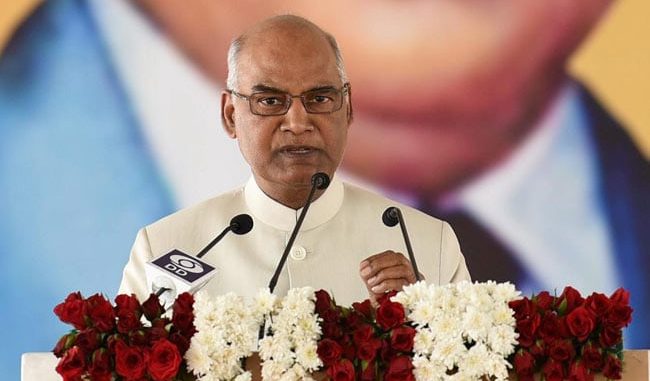
Speaking after inaugurating the 13th edition of CII Agro Tech India-2018 in Chandigarh, Ram Nath Kovind said the Indian farmer has been courageous in converting risk into opportunity.
Chandigarh: President Ram Nath Kovind praised farmers Saturday, saying they have proven to be “remarkably adaptable” to innovation and bold in taking risk, which has helped India become an exporter of key agricultural and allied products. Speaking after inaugurating the 13th edition of CII Agro Tech India-2018 in Chandigarh, which was attended by 195 exhibitors, including 37 from outside India, Kovind said the Indian farmer has been courageous in converting risk into opportunity.
The president’s remarks come a day after opposition leaders rallied behind thousands of farmers from across the country who had gathered in the national capital demanding remunerative prices for their produce and government relief from debt. The farmers, battling a severe agrarian distress, had started to converge in Delhi on Thursday, stayed at the Ramlila Maidan overnight and on Friday morning, they marched through streets shouting slogans to highlight their plight.
Kovind said the government is working towards greater efficiency in agricultural markets, which will give farmers access to a wider customer base and allow them to get better prices. He outlined several government initiatives, such as Pradhan Mantri Krishi Sinchai Yojana and Pradhan Mantri Fasal Bima Yojana, to improve the condition of farmers. The president said the irrigation scheme has covered about one million hectares and the crop insurance scheme has provided a safety net to nearly 25 million farmers.
“These are only a start. In the years to come, we have to cover more farmers and more farm land,” he added. Complementing farmers, Kovind said, “The Indian farmer has proven to be remarkably adaptable, unafraid of innovation, new techniques and scientific inputs”. “As a result India has emerged as an exporter of key agricultural and allied products such as rice, marine products, fruits, vegetables and even flowers. Our farmers supply commercial crops like cotton to the rest of the world.”
He, however, said the challenge now is to scale up. “Indian agriculture needs a renewal of its marriage with contemporary technology, protection against climate change, price fluctuations and demand shocks; and sustained investment by and partnership with business. “Together these will enhance agricultural value and competitiveness, as well as lead to better incomes,” he said.
The National Agricultural Market or eNAM, an online platform for buying and selling agricultural commodities, has linked farmers, traders and buyers across India, he said. The selfless efforts of farmers have contributed to national development and to the wellbeing of people, he said.
“Initiatives such as the Green Revolution, which was carried out with such determination in Punjab, Haryana and neighbouring states, have helped convert a country of chronic food shortages and imports to a food surplus economy. This was possible due to visionary policymakers, ingenious agricultural scientists, and above all, farmers who gave their sweat and toil,” the president said.
He also touched on the issue stubble burning by farmers, saying all stakeholders should come up with a solution. “We are facing a problem related to disposal of crop residue and of safe and clean removal of husk or stubble. In an extreme form, the burning of such items is leading to pollution that affects even little children.”
“It is for all of us, including the state governments, the skilled and large-hearted farmers, and other stakeholders, to come up with a solution,” he said. Stubble burning in some of the northern states pushes air pollution levels to dangerous levels. During winters, Delhi is covered under a thick blanket of toxic smog for several days.
On Saturday however, the contribution of long-range dust or stubble biomass to air pollution in Delhi was negligible, the Centre-run System of Air Quality and Weather Forecasting said. President Kovind also stressed that the link between agriculture and industry must be strengthened for a seamless value chain and minimal wastage.
“To this end, 42 mega food parks are being set up and 228 integrated cold chain projects are underway in different parts of India,” he said. Punjab Governor and Chandigarh Administrator V P Singh Badnore, Haryana Governor Satyadev Narayan Arya, Haryana Chief Minister ML Khattar, Union Agriculture Minister Radha Mohan Singh, Union Food Processing Minister Harsimrat Kaur Badal, CII president Rakesh Bharti Mittal were present at the event.
Source: Times Now

Leave a Reply